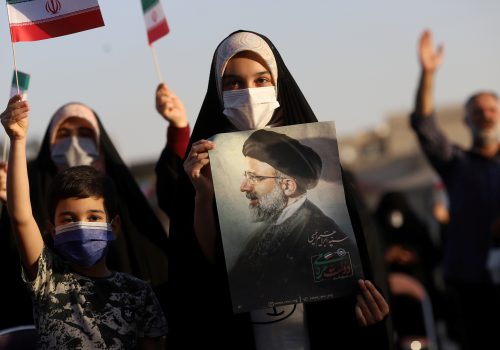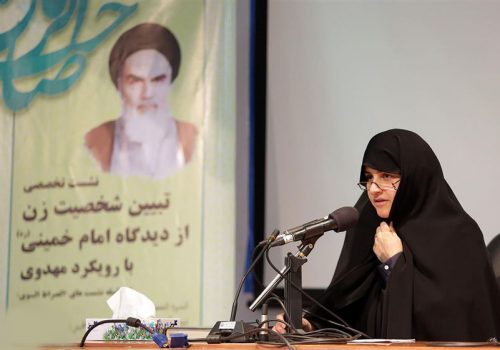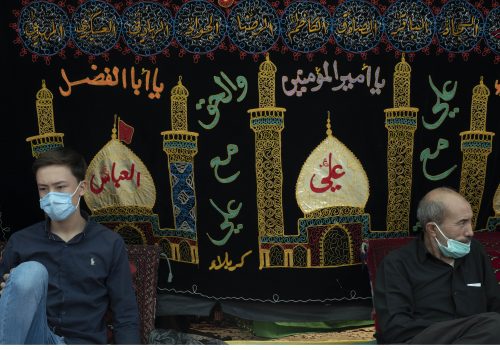Iran’s new face to the world—Hossein Amir-Abdollahian—is no Zarif
Love him or hate him, Mohammad Javad Zarif had unique skills as Iran’s foreign minister for the past eight years. With impeccable English, degrees from prestigious American universities, and decades representing Iran at the United Nations, Zarif was particularly well-equipped to navigate American politics and try to breach the four-decade rift between Washington and Tehran.
His replacement, on the other hand, seems better suited to carry out a policy of “resistance” focused on boosting Iran’s anti-US partners in the Middle East. Hossein Amir-Abdollahianis also a proponent of the Negah Beh Sharq (Look East) foreign policy orientation in Iran.
Born in Damghan in northeastern Semnan province in 1964, Amir-Abdollahian is a career diplomat. He entered Shahid Beheshti University to pursue a degree in laboratory sciences but changed his major and received a bachelor’s in international affairs from the School of International Relations (SIR) at the Iranian Foreign Ministry in 1990. In 1996, he received a master’s in international affairs from the University of Tehran and a PhD in international relations from SIR in 2010. His dissertation, “Sociological Factors in the Failure of the Greater Middle East Initiative,” analyzed the mistakes of the post-September 11, 2001 US strategy in the Middle East, which he attributed to the US disregard of factors related to culture and identity. A fluent speaker of Arabic and somewhat halting English, Amir-Abdollahian has focused on regional Arab politics. From 2009-2011, he published three academic articles on Iraq, Syria, and Bahrain.
Amir-Abdollahian began his formal diplomatic career in 1992 as a political analyst at the foreign ministry’s Persian Gulf First Directorate. He first attracted widespread notice in 2007 as a junior participant in Iraq-chaperoned US-Iran talks in Baghdad. From 2007-2010, he served as Iran’s ambassador to Bahrain and reportedly helped ease tensions with that country’s Sunni minority monarchy.
From 2011-2016, Amir-Abdollahian was Deputy Foreign Minister for Arab and African Affairs under Ali Akbar Salehi, and was responsible for foreign ministry activities in the region, especially the war zones of Iraq, Syria, and Yemen. In that capacity, Amir-Abdollahian grew very close to the Islamic Revolutionary Guards Corps (IRGC). In an interview that was leaked in April to foreclose any presidential aspirations, then-Foreign Minister Zarif claimed that he gave Amir-Abdollahian’s contact information to former Secretary of State John Kerry to coordinate a ceasefire in Yemen with the then-commander of IRGC’S Quds Force, Qasem Soleimani (a US drone strike assassinated Soleimani in Iraq in January 2020).
Amir-Abdollahian also took part in negotiations with the P5+1—US, Russia, China, Britain, France, and Germany—on Iran’s advancing nuclear program but was sidelined after the 2013 election of President Hassan Rouhani. In 2016, Zarif removed Amir-Abdollahian from his deputy ministerial post and offered him the ambassadorship to Oman, which he declined, instead becoming an adviser to the conservative speaker of parliament and former Tehran mayor, Mohammad Baqer Qalibaf.
A number of conflicting reports have emerged about the causes for the dismissal. Rajanews, a hardline outlet close to the IRGC, claimed that the Arab sheikhdoms of the Persian Gulf region demanded his removal as a gesture of good faith by President Rouhani. Other Iranian media outlets reported that the dismissal was the result of his “incompatibility” with the Rouhani administration and a “lack of proper understanding” on regional issues, while others reported that “harsh language” toward Arab countries was the reason. Asked about this, Amir-Abdollahian retorted in 2020: “you should ask Mr. Zarif.” Zarif has previously described Amir-Abdollahian as someone who “talks too much and likes the camera too much.”
Like many Iranian conservatives, Amir-Abdollahian favors a policy more attuned to China than to the US and Europe. In February 2021, he told Iranian state television: “one has to keep in mind that we are located in Asia…Experts believe that the coming decades belong to Asia and emerging powers, especially economic powers, have created this trait that we must re-define our relations with influential countries.” Elsewhere, he made the case that even the West and the US had turned their attention toward the East. He said that this didn’t mean that Iran should not balance its foreign policy but retain its political independence.
During his confirmation hearing on August 22, Amir-Abdollahian claimed that the foreign policy priority for the Ebrahim Raisi administration is a neighborly-centered and Asia-centered approach because he believes the twenty-first century belongs to Asia. “In western Asia we seek to institutionalize the achievements of the ‘Axis of Resistance’ and, in the east, we seek to use the capacities of emerging economic powers to develop our economy and international trade,” he said. Amir-Abdollahian also contended that a balanced foreign policy means not limiting Iran to a specific region or field: “we first identify and prioritize some countries and then take steps to actualize our foreign policy goals.”
Amir-Abdollahian’s appointment should be viewed in the broader context of Iranian disillusionment with the 2015 Joint Comprehensive Plan of Action (JCPOA) and outreach to the west. He has expressed frustration with the European failure to compensate Iran after the Donald Trump administration withdrew unilaterally from the JCPOA in 2018. Speaking on his experiences regarding negotiations with Europeans, in 2020, he claimed that despite Europeans’ niceties, their strategy toward lifting sanctions on Iran is to delay and postpone as much possible: “[During negotiations] as soon as we entered the topic of lifting sanctions they would bring an excuse to postpone [the discussion] to the next meeting…they repeated this three times.”
While mainstream Western media has portrayed Amir-Abdollahian as “anti-Western,” the reality is more nuanced. He has observed that “power is the essence of foreign policy and international affairs,” an anodyne remark of a realist. Regarding the US, he has said that if “they act fairly…we never say we won’t cooperate or negotiate…It is the other side that needs to correct its path.” Amir-Abdollahian also recently tweeted that “negotiations with the US have never been a taboo.”
Given his background, however, Amir-Abdollahian is expected to focus on boosting Iran’s relations with regional partners such as Syria and Iran-backed militias in Iraq and Yemen. With his close relationship with the IRGC and an “Axis of Resistance” approach, the gap between Iran’s foreign ministry and the “deep state” should shrink, bringing more coherence to the higher echelons of national security decision-making.
In short, unlike his predecessor who was distrusted and often marginalized by the IRGC, one should expect more collaboration between what Zarif dubbed “diplomacy and the battlefield.”
Sina Azodi is a nonresident fellow at the Atlantic Council and a visiting scholar at the George Washington University’s Institute for Middle East Studies. He is also a PhD Candidate in International Relations at University of South Florida. Follow him on Twitter @Azodiac83.
Image: Iran's Deputy Foreign Minister Hossein Amir-Abdollahian (L) sits next to Syria's Deputy Foreign Minister Faisal Mekdad during a joint press conference in Damascus, Syria September 3, 2015. REUTERS/Omar Sanadiki


